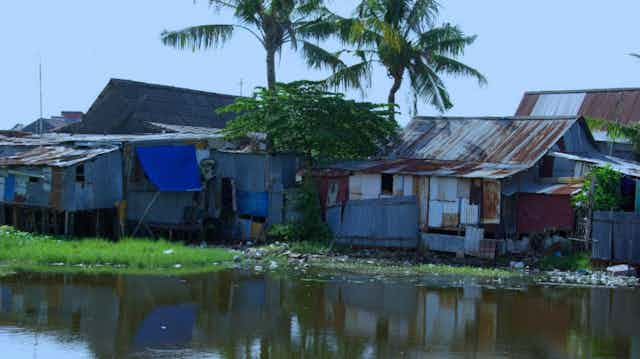Polluted water and inadequate water supply, sanitation and hygiene cause around 80% of diseases and one in four deaths in developing countries. The world is recognising that existing strategies simply aren’t working.
We are starting a five-year project early this year to implement an innovative water-sensitive approach to revitalise 24 informal settlements in Fiji and Indonesia.
Funded by the Wellcome Trust, the project aims to turn informal settlements into independent sites that:
-
recycle their own wastewater;
harvest rainwater;
create green space for water cleansing and food cultivation; and
restore natural waterways to encourage diversity and deal with flooding.
Working with local slum communities, the project will design and deliver modular and multi-functional water infrastructure. This will be tailored to their settlements. Providing secure and reliable water and sanitation services and flood management should improve public health and create more resilient communities.
This project aims to reduce both environmental contamination itself and the likelihood of human contact with contaminants. In doing so, it will provide some of the first quantitative data on the link between improved environmental health and better community health.
Time to rethink failed approaches
In 2010, the United Nations recognised that access to safe water and sanitation is a human right. Five years later, the UN acknowledged it had failed to provide 2.4 billion people with improved sanitation, a goal set 15 years earlier.
The conventional hydraulic engineering solution to these challenges has changed little in 150 years. This approach has major financial, environmental and social costs.
The conventional approach is also an unlikely option for informal settlements this century. These are typically found in developing countries with high rates of urbanisation. These countries are struggling with inadequate resources for basic infrastructure for growing national populations, let alone the poor and vulnerable in informal settlements.

Traditional urban upgrading projects generally focus on basic infrastructure such as housing and drainage. This is delivered primarily via one-dimensional technical solutions. The problem is that these typically don’t take account of the existing local and environmental context.
These approaches often fail to allow for the high rates of urbanisation that characterise informal settlements. This, in turn, exacerbates the inextricably linked challenges of sanitation, water supply and public and environmental health.
The benefits of a new approach
Drawing on programs in Australia, China, Singapore and Israel, the project will alter the biophysical landscape to greatly reduce communities’ exposure to faecal and other hazardous contamination in the environment, while also improving biodiversity.
We anticipate multiple benefits. These include better community health, fewer infections with disease-causing bugs resulting in less diarrhoeal disease, and better intestinal health among children leading to improved growth.
The changes in the living environment should also improve wellbeing, increase food production and decrease violence against women and girls who will, for the first time, have access to domestic sanitation facilities and reliable water supplies.


Importantly, the project begins with a two-year baseline data assessment of both environmental and human health. The infrastructure upgrades will be delivered in year three. These will be followed by another two-year assessment of environmental and health impacts.
A local focus to achieve global goals
The recently adopted UN 2030 Sustainable Development Goals (SDGs) renewed the commitment to universal delivery of essential water and sanitation services.
This global agenda includes goals such as health and wellbeing (Goal 3), improved water and sanitation (Goal 6) and sustainable cities and communities (Goal 11).
While these goals are clearly important, achieving them demands an integrated and holistic approach. Trying to solve each goal individually is not only inefficient in terms of time and money, it can have unintended consequences as it misses the intrinsic connections and feedback loops between them. Our project aims to avoid these pitfalls.
The project includes a significant capacity-building dimension in Fiji and Indonesia. Through dedicated training programs, we will develop in-country communities of practice around the intervention (design and implementation) and the environmental and public health assessments.
Project personnel will provide training and transfer knowledge on the design, construction, operation and maintenance of the technologies.
We will collaborate with local engineers, contractors, governments and community organisations. By building local capabilities around water-sensitive infrastructure, together with our in-country partners, we hope this in-depth engagement will leave a lasting legacy.
An international consortium led by Monash University will deliver the project. It brings together leading researchers in medicine, architecture, engineering, ecology, economics and social sciences, across Monash, CRC for Water Sensitive Cities, Stanford University, Emory University and the University of Melbourne. Other partners include the Asian Development Bank (funding the infrastructure upgrades), Melbourne Water and South East Water, World Health Organisation, Oxfam International and WaterAid.
Our hope is that this project will provide an evidence-based proof of concept that will improve slum upgrading and revitalisation. Providing essential water services and cleaning up the environment should deliver radically enhanced health outcomes for some of the world’s most vulnerable people.
This, we believe, is a real-world solution to achieving what everyone recognises is a global human right: access to clean water and sanitation.

